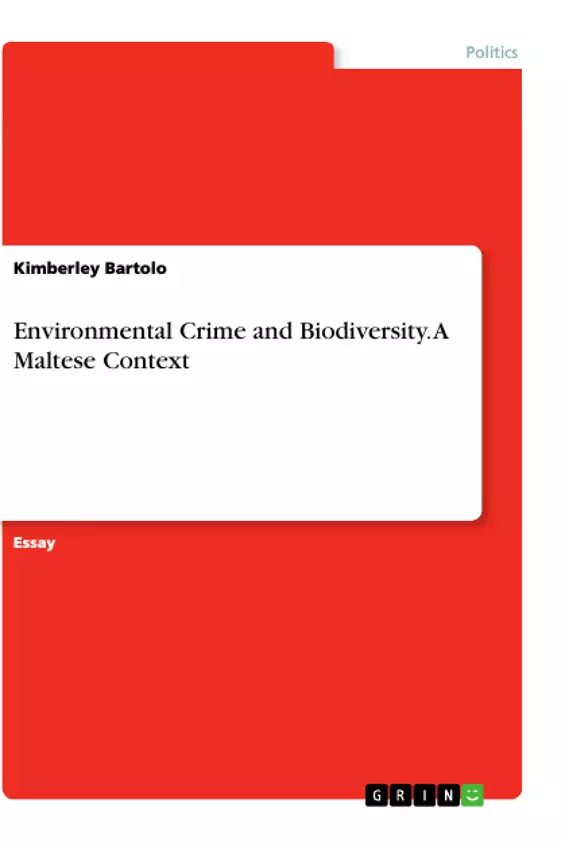This paper deals with the topic of environmental crime and biodiversity crime. After a short introduction the interplay between environmental law and policy is analyzed. Furthermore, the current regulatory framework and its effectiveness in safeguarding and enhancing the environment is examined. Lastly, the framework and its effectiveness in ensuring the sustainable development of Malta's urban, rural, costal and marine area is inspected.
Safeguarding the environment should be a major concern for every human being. This is because if it is not protected, future generations will not be able to enjoy such a planet as it is known today. There are various laws and policies which regulate and enforce the protection of the environment, with the help of several legal tools. Both people and organizations, as well as the government, should focus upon safeguarding the environment in the best ways possible. In fact, Chapter 549 of the Laws of Malta states that, "it shall be the duty of every person to protect the environment" and, "it shall be the duty of the Government to protect the environment for the benefit of the present and future generations."
Environmental crime is a type of crime in which the offender endangers the physical safety or health of a person, as well as the environment, thus is subject to criminal prosecution since the person breached the law. Such crimes are often portrayed as being victimless, however they are not. There are different forms of Environmental crime, which include in illegal development, illegal dumping, overfishing, illegal hunting and hunting for protected species
Inhaltsverzeichnis (Table of Contents)
- 1.1 Introduction
- 1.2 The interplay between Environmental Law and Policy
- 1.3 Examining the current Regulatory Framework and its effectiveness in:
- 1.3.1 Safeguarding and enhancing the Environment; preventing or decreasing Environmental crime
- 1.3.2 Ensuring the Sustainable Development of Malta's urban, rural, coastal and marine area
- 1.4 Conclusion
- References
Zielsetzung und Themenschwerpunkte (Objectives and Key Themes)
This text examines the interplay between environmental law and policy in the Maltese context, focusing on the effectiveness of the regulatory framework in safeguarding and enhancing the environment, preventing or decreasing environmental crime, and ensuring sustainable development.
- The role of environmental law and policy in protecting the environment.
- The effectiveness of Malta's regulatory framework in addressing environmental challenges.
- The interplay between legal regimes and policy frameworks in environmental protection.
- The importance of sustainable development in Malta's urban, rural, coastal and marine areas.
- The challenges and opportunities presented by the current regulatory framework.
Zusammenfassung der Kapitel (Chapter Summaries)
The text begins by introducing the importance of environmental protection and the role of law and policy in safeguarding the environment. It then explores the interplay between environmental law and policy, examining the current regulatory framework in Malta and its effectiveness in achieving its objectives. The analysis delves into the specific challenges and opportunities presented by the current legal and policy landscape.
The text provides a comprehensive overview of the regulatory framework in place, including the relevant legislation and policies. It examines the effectiveness of these measures in addressing environmental crime, safeguarding biodiversity, and ensuring sustainable development. It also considers the role of different stakeholders in the implementation of these policies.
Schlüsselwörter (Keywords)
Environmental law, environmental policy, Malta, regulatory framework, environmental protection, sustainable development, environmental crime, biodiversity, coastal and marine area.
Frequently Asked Questions
What is the legal duty regarding environmental protection in Malta?
According to Chapter 549 of the Laws of Malta, it is the duty of every person to protect the environment, and the government's duty to protect it for present and future generations.
What are common forms of environmental crime?
Common forms include illegal development, illegal dumping, overfishing, illegal hunting, and the hunting of protected species.
Is environmental crime considered a victimless crime?
No, although often portrayed as such, environmental crimes endanger physical safety, health, and the planet's future, making them harmful to society.
How effective is Malta's regulatory framework for biodiversity?
The text examines the current laws and policies, analyzing their effectiveness in safeguarding Malta's unique urban, rural, and marine areas against environmental threats.
What is the link between environmental law and policy?
The framework relies on the interplay between legislative acts and policy enforcement tools to ensure sustainable development and decrease criminal activity.
- Quote paper
- Kimberley Bartolo (Author), 2019, Environmental Crime and Biodiversity. A Maltese Context, Munich, GRIN Verlag, https://www.grin.com/document/958696



